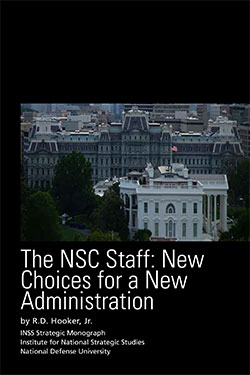 Early in every new administration, the President and his national
security team are inundated with studies offering advice on how to
organize for national security. Many propose sweeping changes in the
size, structure, and mission of the National Security Council (NSC)
staff, the fulcrum of national security decisionmaking. However attractive
superficially, organizational tinkering is unlikely to drive better
performance. This paper argues that structure and process are less
important than leadership and the quality of NSC staffing. No duty
rises higher than the President’s call to defend the Constitution and
the people and territory it nourishes. That duty will be tested early and
often. An NSC staff that is up to the task will play an enormous role
in keeping the United States safe.1
Early in every new administration, the President and his national
security team are inundated with studies offering advice on how to
organize for national security. Many propose sweeping changes in the
size, structure, and mission of the National Security Council (NSC)
staff, the fulcrum of national security decisionmaking. However attractive
superficially, organizational tinkering is unlikely to drive better
performance. This paper argues that structure and process are less
important than leadership and the quality of NSC staffing. No duty
rises higher than the President’s call to defend the Constitution and
the people and territory it nourishes. That duty will be tested early and
often. An NSC staff that is up to the task will play an enormous role
in keeping the United States safe.1
What Does the NSC Staff Do?
The NSC staff has four primary roles: to advise the President in
the field of national security affairs, to manage and coordinate the
interagency process in formulating national security policy, to broadly
monitor policy execution, and to staff the President for national security
meetings, trips, and events. Many assume that the NSC staff
does, or should do, much more. But it is first and foremost the President’s
personal national security staff.2 Other tasks—such as generating
independent, whole of government national security policies and
strategies, or conducting detailed, daily implementation oversight—
would require a much larger staff and inevitably lead to ponderous,
centralized, and ultimately dysfunctional behaviors that would prevent
responsive support to the President. Long-range “strategic” planning
is surely essential, but more properly belongs to the interagency as
a whole, vetted by the Deputies and Principals Committees and approved
by the full National Security Council.
The NSC’s role as a process manager is not synonymous with policy
advocacy. While the National Security Advisor (NSA) may and often
will recommend a given course of action, a more critical function is ensuring that all viewpoints are heard and objectively assessed, and
that important issues are framed for decision. When allowed to become
an operational entity (as occurred during the Iran-Contra affair) or to
effectively preempt the Departments of State and Defense (as in the
Richard Nixon, Gerald Ford, and Jimmy Carter eras), the NSC staff
has historically stumbled.3 Properly focused and chartered, the NSC
staff can empower and facilitate an interagency process that is otherwise
cumbersome.
Over time, the NSC staff has become immersed in policy detail
and in responding to urgent or crisis events, fed largely by a 24-hour
news cycle. This in turn creates pressure for staff growth. The result is
a diminished ability to conduct high-level, far-seeing policy work at the
appropriate strategic level. A smaller NSC staff by definition is unable
to immerse itself in detailed policy oversight and micromanagement, a
compelling argument for reductions in future administrations.
In this regard, the NSC staff is not a line entity, statutorily empowered
to give orders in its own name. And significantly, it should not
be an interagency planning headquarters. It may forward Presidential
guidance and direction through formal channels or an approved interagency
body such as the Principals Committee. It cannot direct or
demand. However, the NSC staff and its head, the National Security
Advisor, enjoy two distinct advantages: access to the President, and
the ability to set the policy agenda in national security affairs. Used
judiciously, these represent real power.
READ MORE >>